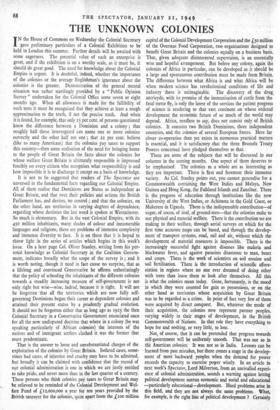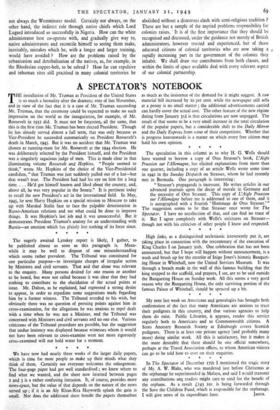THE UNKNOWN COLONIES
TN the House of Commons on Wednesday the Colonial Secretary gave preliminary particulars of a Colonial Exhibition to be held in London this summer. Further details will be awaited with some eagerness. The potential value of such an enterprise, is great, and if the exhibition is on a worthy scale, as it must be, it should do great good. The need for knowledge about the Colonial Empire is urgent. It is doubtful, indeed, whether the importance of the colonies or the average Englishman's ignorance about the colonies is the greater. Demonstration of the general mental situation was rather startlingly provided by a " Public Opinion Survey " undertaken for the Colonial Office some seven or eight months ago. When all allowance is made for the fallibility of such tests it must be recognised that they achieve at least a rough approximation to the truth, if not the precise truth. And when it is found, for example, that only 25 per cent. of persons questioned know the difference between a Dominion and a colony ; that roughly half those interrogated can name one or more colonies correctly and the other half not one ; that. 22 per cent. believe (like so many Americans) that the colonies pay taxes to support this country—then- some realisation of the need for bringing home to the people of Great Britain the facts about the colonies for whose welfare Great Britain is ultimately responsible is impressed forcibly on every citizen who recognises what responsibility is and how impossible it is to discharge it except on a basis of knowledge.
It is not to be suggested that readers of The Spectator are unversed in the fundamental facts regarding our Colonial Empire. All of them realise that Dominions are States as independent as Great Britain, and that over their policies and actions the British Parliament has, and desires, no control ; and that the colonies, on the other hand, are territories in varying degrees of dependence, regarding whose destinies the last word is spoken at Westminster. So much is elementary. But in the vast Colonial Empire, with its 450 million inhabitants, many shades of colour and' innumerable languages and religions, there are problems of immense complexity and immense diversity to face. It is on these that it is hoped to throw light in the series' of articles which. begins in this week's issue. On a later page CoI. Oliver Stanley, writing froth his-per- Soria' knowledge as Colonial Secretary in the Coalition Govern- ment, indicates broadly what the scope of the survey is ; and it is worth noting, though it need in fact cause no surprise, that as a lifelong and convinced Conservative he affirms unhesitatingly that the policy of schooling the inhabitants of the different colonies towards a steadily increasing measure of self-goVernment is not only 'right but wise—wise, indeed, because it is right. It will not be forgotten "that all the territories which are now fully self- governing Dominions began their career as dependent colonies and attained their present status by a prudently gradual evolution. It should not be forgotten either that as long ago as 1923 the then Colonial Secretary in a Conservative Government enunciated once for all the now undisputed doctrine that where in a colony (he was speaking particularly of African colonies) the interests of the natives and of immigrant settlers clashed it was -the former that must predominate.
That -is the answer to loose and unsubstantiated charges of the exploitation of the colonies by Great Britain. Isolated cases, some- times bad cases, of injustice and cruelty may have to be admitted, but broadly it can be claimed with confidence that the record of our colonial administration is one in which we are justly entitled to take pride, and never more than in the last quarter of a century. Those persons who think colonies pay taxes to Great Britain may be relieved to be reminded of the Colonial Development and Wel- fare Fund of £12,000,000 a year for ten years provided by the British taxpayer for the colonies, quite apart from the Lim) million capital of the Colonial Development Corporation and the £50 million of the Overseas Food Corporation, two organisations designed to benefit Great Britain and the colonies equally on a business basis. That, given adequate disinterested supervision, is an essentially wise and hopeful arrangement. But before any colony, again the colonies of Africa in particular, can be developed as it should be a large and spontaneous contribution must be made from Britain. The difference between what Africa is and what Africa will' be when modern science has revolutionised conditions of life and industry there is unimaginable. The discovery of the drug. antricyde, with its promise of the immunisation, of cattle from the fatal tsetse fly, is only the latest of the services the patient progress of science is rendering to that vast continent on whose ordered development. the econcimic future of so much of the world may depend. Africa, needless to say, does not consist only of British colonies. It contains, two British Dominions, three independent countries, and the colonies of several European States. Here far closer co-operation than yet exists in numerous practical matters is essential, and it i&-satisfactory .that the three Brussels Treaty Powers concerned have pledged themselves to that.
These are some of the subjects that will be discussed in our columns in the coming months. One aspect of them deserves to be emphasised. The colonies as a whole are as interesting as they are important. There is first and foremost their immense variety. As Col. Stanley points out, you. cannot generaliie for a Commonwealth containing the West Indies and Malaya, New Guinea and Hong Kong, the Falkland Islands and Zanzibar. There is the progress of education through institutions hie the new University of the West Indies, or Achimota in the Gold Coast, or Makerere in Uganda. There is the indispensable contribution--of sugar, of cocoa, of sisal, of ground-nuts—that the colonies make to our physical and material welfaie. There is the contribution we are making to their welfare; through aerial surveys on which for the first time accurate maps can be based, and through the develop=' ment of transport systems, road, rail and air, without which the development of material resources is impossible. There is the increasingly successful fight against diseases like malaria and blackwater fever, and against parasites disastrous to man, beast and crops. There is the work of scientists on soil erosion and soil fertilisation. There is the introduction of scientific affore- station in regions where no one ever dreamed of doing other with trees than leave them to look after themselves. All this is what the colonies mean today. Gone, fortunately, is the mood in which they were counted for gain as possessions, or on the other hand as territories whose acquisition by Great Britain was to be regarded as'a crime. In point of fact very few of them were acquired by direct conquest. But, whatever the mode of their acquisition, the colonies now represent partner peoples, varying widely in their stages of development, in the British Commonwealth of Nations. In that role they have everything to hope for and nothing, or very little, to lose.
Not, of course, that it can be pretended that progress towards self-government will be uniformly smooth. That was -not so in thi American colonie&.. It was not so in India. Lessons can be learned from past mistakes, but there comes a stage in the develop- ment of most backward peoples when the demand for power exceeds the capacity to exercise power wisely. In an article in next week's Spectator, Lord Milverton, from an unrivalled experi- ence of colonial Administrition, sounds a warning against letting political development outrun economic and social and educational —particularly educational—development. Hard problems arise in this field, and they are not always the same problems. What, for example, is the right line of political development ? Certainly not always the Westminster model. Certainly not always, on the other hand, the indirect rule through native chiefs which Lord Lugard introduced so successfully in Nigeria. How can the white administrator best co-operate with, and gradually give way to, native administrators and reconcile himself to seeing them make, inevitably, mistakes which he, with a longer and larger training, would have avoided ? How are the problems raised by the urbanisation and detribalisation of the natives, as, for example, in the Rhodesian copper-belt, to be solved ? How far can repulsive and inhuman rites still practised in many colonial territories be abolished without a disastrous clash with semi-religious tradition ? These are but a sample of the myriad problems responsibility for colonies raises.. It is of the first importance that they should be recognised and discussed, under the guidance not merely of British administrators, however trusted and experienced, but of those educated citizens of colonial territories who are now taking a . rapidly increasing part in the government of the colonies they inhabit. We shall draw our contributors from both classes, and within the limits of space available deal with every relevant aspect of our colonial partnership.







































 Previous page
Previous page